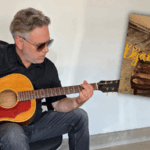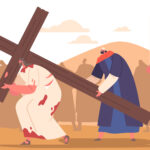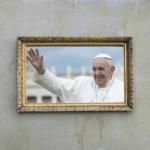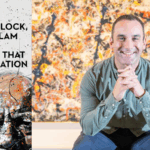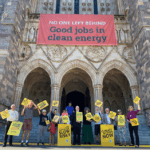Proud Wiradjuri woman Mikenzie Ling, First Peoples Strategy and Engagement Consultant for the Uniting Church Synod of NSW and ACT shares a message for Survival Day .
Yaama! Yuwin Ngadhi Mikenzie.Hello. My name is Mikenzie. And I’m proud to be Wiradjuri.
I just want to take a moment to acknowledge the Gadigal lands on which I’m standing today and speaking to you, and acknowledge the Elders, past, present and ongoing, the people’s relationship unbroken to these lands. And also a moment to acknowledge lands from which you’re listening and where you’re sitting on. No matter where you stand or sit in Australia, you’re sitting On Country.
Now we’re fast approaching the end of our month. And a date which holds a lot of tension and weight in this nation. January 26th. For some, this is a national holiday. For some, it can be the anniversary of your citizenship. But there are those of us for which this day is a day of mourning.
For the First Nations people, this marks a pretty painful turn in the story of our peoples and our lands. Personally, it holds a really complex mix of emotions. I have pain and grief and even anger sometimes over the history and the ongoing effects of that history for my people, family and friends, communities, our land, our entire kinship system, and the impact that is still felt today from those events and that legacy, that history.
Alongside of it, there’s also a bittersweet sense of gratitude and even pride for my people that have gone before, that have in a deep well of strength and dignity and commitment, ensured that our identity, our culture, our connection to country has survived.
There’s people like William Cooper, who in 1938 staged a protest, held a protest, calling the attention of the nation to the injustices and the plight of indigenous people, First Nations people. That became what we call the day of mourning, January 26th. This was long before there was a national holiday, before the basis of union in this church, and there’s a legacy to that. We have NAIDOC Week that we celebrate later in the year that finds its roots within that protest.
And there’s countless others, in countless places, that have done the same thing. They have carried story. They have stood for our people. Even often times sitting for our people to ensure that the generations that would come behind them would survive and even thrive. Being able to hold our culture and identity with that sense of pride and gratitude.
And for myself, that’s where I sit and I reflect during Survival Day, is the cost of what’s come before in order that I would survive and be able to continue to live out my identity as an Aboriginal woman.
I’ve been reading in Genesis recently, and two points from a commentary that I read, I really wanted to share today around Survival Day. The first is on lineages. Those lists of name upon name, usually in the Old Testament, where I think sometimes there’s a bit of a tendency or a temptation to kind of skip over them, thinking they’re not so relevant today.
But when we read a bit deeper, we actually realise that every single name has a really specific, important meeting. And they act almost like chapters in a story of God recounting what God did in that generation, or who he was to them in that time and space, and how he’s journeyed with them down those generations. It really indicates the importance and the care that God holds over our family lines and our generations.
For me, when I read that, it reminds me that God cares about my generations, about those who have come before and those who will come after. And in Survival Day, it’s that extra layer of remembrance and of acknowledgment over those things.
Download this video here.
The second thing that I wanted to share was from the story of Noah, and it’s around the dove.
So the dove is a symbol of the Holy Spirit in this story. And death and destruction has raged over the entire land.
And yet Noah and his family, the animals have survived in the Ark being that provision and the ordained salvation brought by God. They have had their life survived, sustained. And then the Holy Spirit, the dove goes out, it flies out and hovers over the waters like he did in the creation story and is looking for good soil. Being the Holy Spirit, he can’t land and descend where there’s death and destruction.
There must be the ability for life to be brought forth and to be sustained. And I think it’s a really great reminder, and opportunity, for us to reflect and to consider the soil of our own hearts as a community, as individuals, as a country. How are we showing up as land that is good for life, that sustains that life?
And are we the kind of land, are we the kind of country that is honouring what God honours and valuing what God values? Do we see and care about the stories, the lives, the lineages, those people through which the story of God has travelled down the generations?
So we really want to extend that as a bit of a challenge, and an invitation for you to journey with us. How are you marking Survival Day? How are you thinking about that? Is there space held for our peoples and our stories in your life, in your congregation?
And there are a few ways you can go about this. I always say relationally, with the people in your world, your congregation, your community, First Nations, people in those spaces. And we also have amazing resources on our website for places where you can go find ways to learn more about our stories and our nation stories, but also ways to find out more about Survival Day and what it is and where it comes from.
Resources for your congregation, and a guide to developing your own Walking Together Action Plan are available at https://firstnationsresources.uca.org.au







